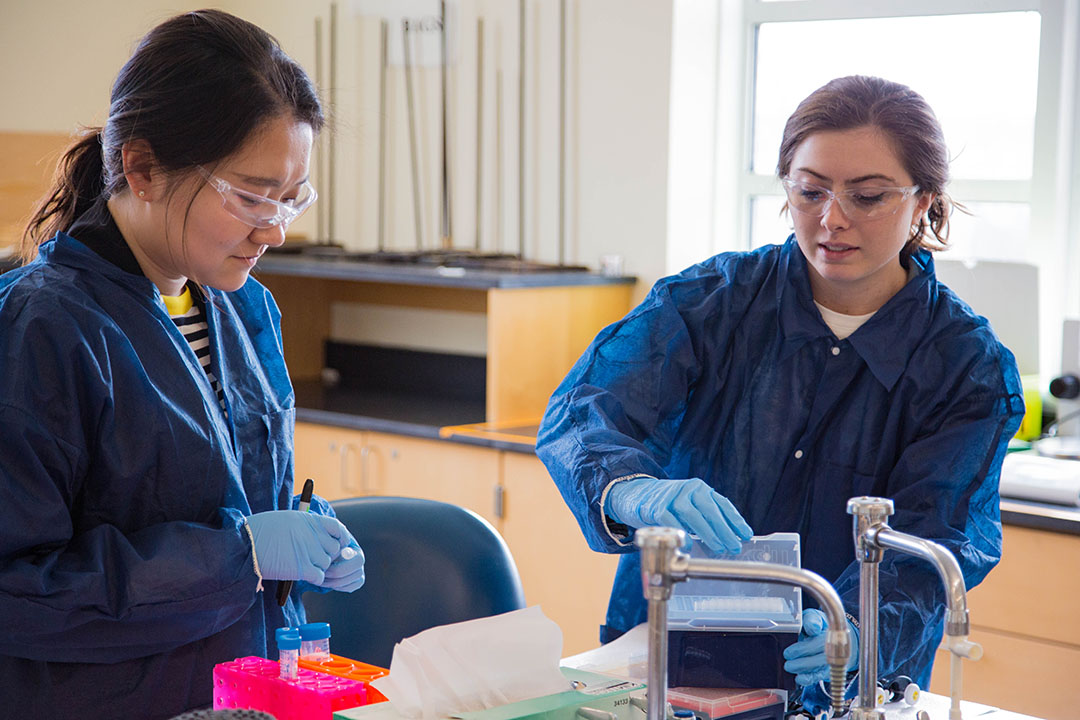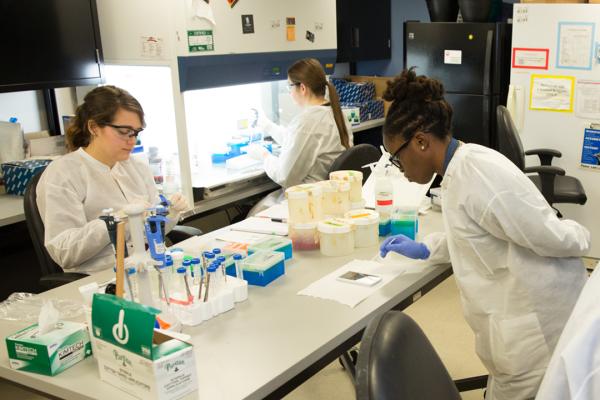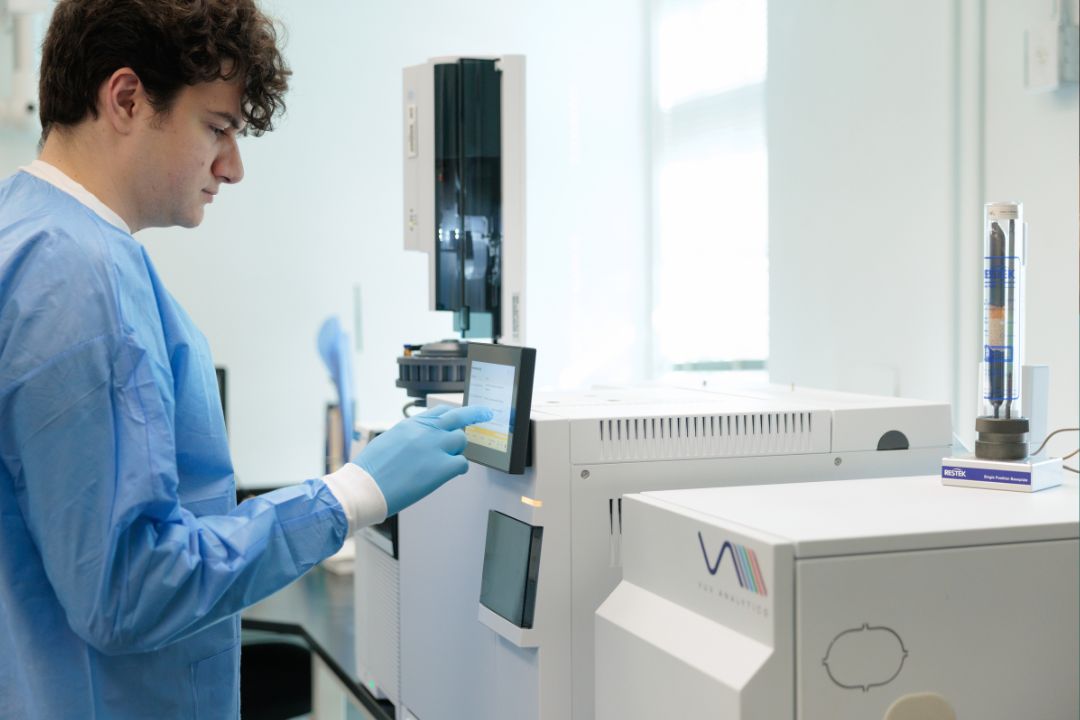Programs
In the GW Department of Forensic Sciences, challenging science courses are just one part of our comprehensive approach to learning. Our curriculum integrates traditional study with faculty mentorship in the lab and hands-on projects, for a truly interdisciplinary experience. From identifying chemical compositions to tracking bullet casings to performing bloodstain analysis, our students graduate with the technical skills necessary to succeed in the forensic science workforce. It is important to know that background checks, similar to those required for law enforcement officers, are likely to be a condition of employment for forensic scientists.
Graduate Degrees
Combined and Certificate Programs
FEPAC-Accredited Programs
The MFS in Forensic Chemistry and MFS in Molecular Biology programs are accredited by the Forensic Science Education Programs Accreditation Commission (FEPAC).
Established by the American Academy of Forensic Sciences (AAFS), FEPAC accreditation ensures that a student’s education reflects the industry’s best practices and includes the most up-to-date training. Students with FEPAC certification are prepared to meet the surging demand for forensic DNA analysis in all areas of law enforcement.
Student Outcomes
| Percentage of Students Passing on First Attempt | 2021 | 2022 | 2023 | 2024 | 2025 |
|---|---|---|---|---|---|
| All Comprehensive Exams | 80% | 91% | 87% | 90% | 86% |
| MFS Comprehensive Exam | 84% | 87% | 80% | 79% | 88% |
| Final Passing for all | 100% | 100% | 100% | 100% | 100% |
Student Enrollments
| Academic Year | 22-23 | 23-24 | 24-25 | 25-26 |
|---|---|---|---|---|
| Forensic Molecular Biology | 19 | 22 | 30 | 25 |
| Forensic Chemistry | 8 | 14 | 20 | 22 |
| No Concentration | 5 | 5 | 4 | 8 |
| Crime Scene Investigations | 15 | 22 | 29 | 40 |
| Graduates | 23 | 23 | 34 |
2024-25 Research Project/Capstone
| Academic Year | Type of Experience | Title or Topic of project / area of study: | Location |
| 2024-2025 | Research Project | Novel Approaches to Increase Specificity for Difficult Isomeric Separations with Ultra-High Performance LiquidChromatography (UHPLC) for Analysis of Seized Drug | GW |
| Research Project | A Green Method for Seized Drug Screening using a Portable LiquidChromatograph with UV-LEDDetection | GW | |
| Research Project | The Sequential Optimization of Parameters for the Reversed-Phase LiquidChromatographic Separation of NinePositional Isomers of ∆9-Tetrahydrocannabinol | GW | |
| Research Project | The Development and Optimization of a GeneralAnalysisGas Chromatography- Mass Spectroscopy (GC-MS) Method for Drugs using Hydrogen Carrier Gas | GW | |
| Research Project | The Development and Optimization of a Methodfor the Quantitation of Fentanyl Mixtures Using Rapid Gas Chromatography Mass Spectrometry | NIST | |
| Research Project | The Development of SoftIonization by Chemical Reaction in Transfer (SICRIT) coupled to a Time-of- Flight (TOF) Mass Spectrometer for Rapid SeizedDrug | NIST | |
| Research Project | Reliability of Recorded RidgeBreaks Near Phalangeal Creases | GW | |
| Research Project | Effect of Elevated Heaton Animal Fibersand Human Hair | GW | |
| Research Project | Assessment of the RapidHIT ID v2.0 forUse on Evidentiary Samples andIts Suitability for Implementation into Law Enforcement | Bode Technologies | |
| Research Project | Evaluation of the Effects of Saltwater and Freshwater Environments on DNA Recovery from Skeletonized Human Remains | GW | |
| Research Project | SNP Analysis of DNA Recovered from Submerged Human Remains Using Precision ID Identity Paneland Precision ID Ancestry Panel | GW | |
| Research Project | Analysis of Touch DNA on Firearms Based on Activity Levels | GW | |
| Research Project | Mixture Interpretation of Touch DNAon Firearm | GW | |
| Research Project | Evaluating the Efficiency of STK Skin for the Identification of Semen on Various Hair Types | GW | |
| Research Project | Testing WholeGenome Amplification on DNA Fragments to Improve STR Profiles from Fragmented DNA | GW | |
| Research Project | Species Identification of the Hairsin a Holocaust Blanket | GW | |
| Research Project | Size-Selective Purification to Separate High and Low Molecular Weight DNA | GW | |
| Research Project | Developing a mtDNA Mixture Analysis Pathway with Phase Analysis | GW | |
| Research Project | Using mtDNAto Enhance Numberof Contributor Inference for STR Mixture Deconvolution | GW | |
| Research Project | Construction of a Microhaplotype Panel for Complex Mixture Deconvolution using Next Generation Sequencing | GW | |
| Research Project | Investigating the Limits of Low Input DNA for Whole Genome Sequencing of Cryptosporidium | USDA | |
| Research Project | Comparison of Touch DNAon PVC Pipesfrom Different Swabs | GW | |
| Research Project | A ModernReview of Erythritol Tetranitrate | GW | |
| Research Project | Comparing the Selectivity of Gas Chromatography Derivative Vacuum Ultraviolet Detection and Gas Chromatography MassSpectrometry for theAnalysis of Synthetic Cathinone Positional Isomers | GW | |
| Research Project | Determining the Utility of Gas Chromatography- Derivative Vacuum Ultraviolet Spectroscopy for Seized Drug Analysis Through Comparison to Gas Chromatography-Mass Spectrometry Capabilities | GW |
2023-24 Internship / Research Project/ Capstone Experience Information
| Academic Year | Type of Experience (internship, research, or capstone) | Title or Topic of Project / Area of Study: | Location (applicable if internship is the ‘type of experience’) |
|---|---|---|---|
| 2023 - 2024 | Research Project | GC Derivative VUV Spectroscopy of JWH-018 Positional Isomers and Select Synthetic Cannabinoid Diastereomers | GW |
| Research Project | Investigation of Extraction Protocols for the Analysis and Quantitation of Cannabinoids in Gummy Matrices using Liquid Chromatography and Photo-diode Array Ultraviolet Detection | NIST | |
| Research Project | Evaluation of the ForenSeq™ Kintelligence chemistry on the MiSeq FGx™ Sequencing platform and its usefulness and limitations for Forensic Investigative Genetic Genealogy | Bode Technology | |
| Research Project | From Sanger Sequencing to Next Generation Sequencing (NGS): Updating the NIST Variant Allele Sequencing Program | NIST | |
| Research Project | On the viability and potential value of current and emerging neuroscience and technologies to the practice of forensic science | GW and GU | |
| Research Project | Utility of Fentanyl Test Strips for the Screening of Seized Drugs | GW and Washington DC DFS | |
| Research Project | A Comparison between STR and Microhaplotype Molecular Markers in DNA Mixture Deconvolution using EuroForMix | GW | |
| Research Project | Optimized Recovery and Genotyping of Nuclear DNA from Rootless Human Hair by Capillary Electrophoresis | GW | |
| Research Project | Analysis of Touch DNA Mixtures on Guns Based on Activity Level | GW | |
| Research Project | Assessing the Efficiency of STK Skinfor Identification of Semen on Hair and Body | GW | |
| Research Project | Evaluating the Efficacy of STK Skin Spray® for Semen Stain Detection on Hair Under Varied Washing Conditions | GW | |
| Research Project | Sequence Characteristics that Affect Drop Out of Autosomal | GW | |
| Research Project | Optimized Reference Punch Sample Collection from various Collection Devices | GW |
2022-23 Internship / Research Project/ Capstone Experience Information
| Academic Year | Type of Experience (internship, research, or capstone) | Title or Topic of Project / Area of Study: | Location (applicable if internship is the ‘type of experience’) |
|---|---|---|---|
| 2022 - 2023 | Research Project | The Utility of “Flip-flop” Chromatography Employing Silica Hydride Stationary Phases with Simultaneous Ultraviolet and Single Quadrupole Mass Detection for the Analysis of Seized Drugs | GW |
| Research Project | Development and Validation of a Rapid GC-MS Method for Seized Drug Screening | NIST | |
| Research Project | Gas Chromatography-Vacuum Ultraviolet Detection of JWH-018 Positonal Isomers and Select Diasteromeric Synthetic Cannabinoids | GW | |
| Research Project | The Use of Portable Capillary Liquid Chromatography with Dual Silica Hydride Sttionary Phases and Dual Ultraviolet Wavelength Detection for the Analysis of Synthetic Cathinone Positional Isomers | GW | |
| Research Project | The Effects of Temperature and Humidity on Paper Surface Texture Measured using Fractal Dimension Analysis | GW | |
| Research Project | Characterization of the drop-out of sequenced autosomal STR alleles from genetic profiles generated using a modified ForenSeq DNA Signature Prep Kit protocol | GW | |
| Research Project | Determining linkage patterns for identity SNPs found in common forensic sequencing assays | GW | |
| Research Project | An assessment of probabilistic genotyping software EuroForMix for mixture deconvolution using microhaplotypes | GW | |
| Research Project | Probabilistic Genotyping of Microhaplotype Mixture Profiles using DNA-VIEW® Mixture Solution™ | GW | |
| Research Project | THE PROGRESS ON OBTAINING NUCLEAR DNA PROFILES FROM A HUMAN HAIR SHAFT | GW | |
| Research Project | Characterization of Stutter Artifacts of Sequenced Autosomal Short Tandem Repeats | GW | |
| Research Project | Stability of Forensic Buccal Swabs Stored Short Term at Room Temperature in GenDry™ Pouches | GW | |
| Research Project | Collection of touch DNA from skin to skin contact at various time intervals | GW | |
| Research Project | Detection and Photography of Forensic Evidence using Infrared and Ultraviolet Filters | GW |
"I want students to remember that every case there is a family that needs to be reunited with their loved one, a victim that needs closure or a criminal that, if not apprehended, will hurt other people."
Daniele Podini
Chair, Associate Professor of Forensic Molecular Biology











